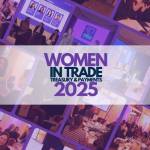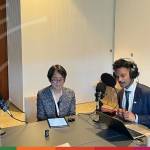Women in Trade 2022
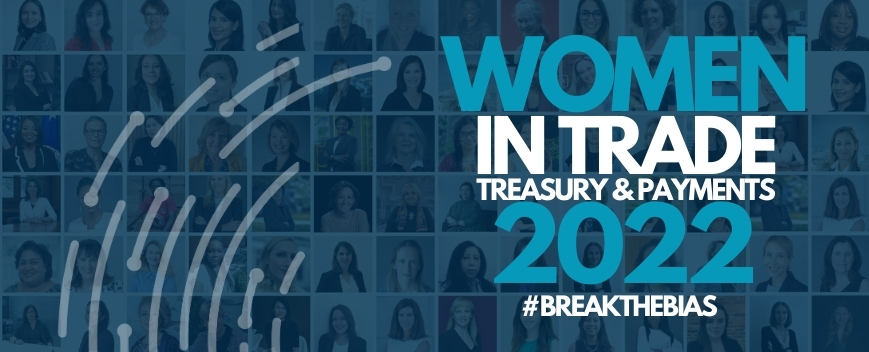
Content
Why is #BreakTheBias important for TFG?
Our mission is to remove the barriers from trade.
We want our information to be accessible to all.
For every professional to learn, for every business to grow.
No barriers. No economic bias. That shapes everything we do.
We know trade opens doors to change on a global scale and that is why, what we do and how we do it matters.
You usually hear us talk about the Trade Finance Gap or even the Trade Finance Education Gap, but not today.
We want to share and celebrate the diverse journeys of Women In Trade to prompt conversations about the Gender Pay Gap.
Women shouldn’t have to trade off who they are. Together we can #BreakTheBias.
Share your #BreakTheBias recipe, as Marilyn Blattner-Hoyle dishes up hers on International Women’s Day 2022.
Harnessing her newly experienced lens of mother and business leader (order immaterial) Marilyn share’s her approach to people-innovation.
Read Marilyn’s recipe to #BreakTheBias here →
What does #BreakTheBias mean to me?
Natasha Roston, Trade Finance Global
Unsurprisingly as a former teacher and current Head of Learning & Development, it’s all about education. It is only through education that we can remove bias, stereotypes and discrimination.
To be clear, International Women’s Day (IWD) is not about educating women, it’s about educating society. It’s about educating how we can all treat each other now and for the future. It’s about how we can challenge the stereotypes of today and how to bring up the next generation, to ensure these are no longer the prejudices of tomorrow.
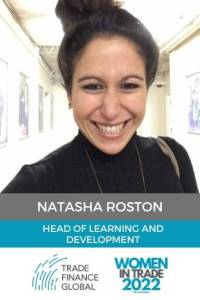
If we want women to be present and raise their voice in environments where men previously dominated, we need to change how we treat girls and boys from their very first experiences of life. From day one. These are embedded societal issues on a giant scale.
Here’s to choice. Here’s to diversity. Here’s to education.
Here’s to breaking the bias.
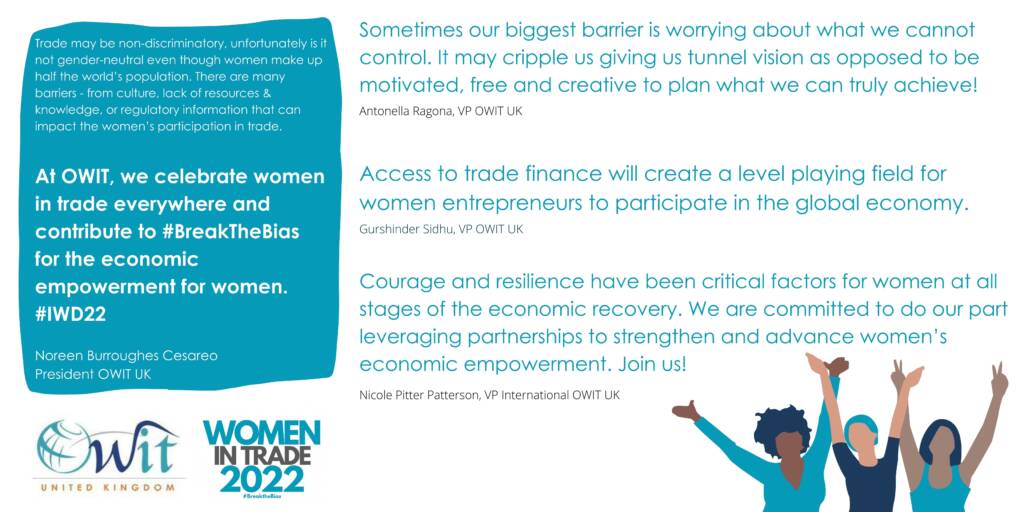
IWD 2022 | TFG’s Top Ten Questions to #BreakTheBias
1. Why did you choose a career in the sector of international trade, supply chain or receivables finance?
2. Have you encountered any related challenges in your career along the way to becoming who you are today?
3. What do you enjoy the most about your job?
4. What is so exciting / significant about being involved in trade at this time?
5. Why do you think it’s important for more women to take up a career in trade?
6. Do you find that there is a gender gap in trade and trade finance? How has this impacted you?
7. How can we #BreakTheBias in the international trade/ trade finance community?
8. How do we attract more women into careers within the trade / trade finance industry?
9. What’s the most important piece of advice you’d give to a woman thinking of starting a career in trade finance?
10. What is the most important message you want to send out to young women about to start their career?
Monica Eunice Apostol | Local Process Expert, ING

What do you enjoy the most about your job?
I enjoy brainstorming with energetic individuals and finding the best solution for our business needs. I find great joy in hearing that we are able to make their work and processes easier. It is invigorating to see when our efforts pay off, and know that the improvements impacted a lot of people positively.
What is so exciting about being involved in trade at this time?
It’s an extremely exciting moment for Trade in terms of Digitalization. More and more entities are adopting solutions that cater to the needs of every stakeholder.
Processes that were considered cumbersome are now being done with renewed interest.
Do you find that there is a gender gap in trade? How has this impacted you?
There is now a more conscious effort from financial institutions to address the gender gap in the business community. Companies are more self-aware and are able to realize that they need to implement concrete steps toward equal opportunities for everyone. It is inspiring to see leaders that acknowledge bridging the gender gap as an important goal.
Maram Al-Jazireh | Global Head of FI, Arab Bank

What do you enjoy the most about your job?
I most enjoy the connectivity with other markets, communities and cultures. You get to learn a lot about a country and its people through the goods that are being traded, its trading partners, its key imports and also its key strengths, ie, exports.
For me to enjoy my job, I need to have a sense of purpose on both a professional as well as personal level. So basically accomplishing the job at hand while continuously learning something new about the world we live in is my winning formula for enjoying what I do.
How can we #breakthebias in the international trade / trade finance community?
We can definitely #BreakTheBias by neutralizing it with a new hashtag, #nurturediversity. Gender equality hence diversity brings in different skill sets that are needed in international trade. The word “international” connotes variety, dynamism and progress which is best handled by a diverse workplace and gender equality is a key ingredient.
How do we attract more women into careers within the trade / trade finance industry that has traditionally been dominated by men?
Trade Finance involves telling a story about the progression of nations and I believe that a reasonable narration of that story would shine a light on how one of the oldest lines of business in history has evolved, developed and continuously contributed to thriving economies and healthy communities.
Trade Finance as we all know has very technical and task oriented facets but by the same token its connectivity and creativity aspects have always been at the core of trade. Not only would that kind of story-telling attract more women but it would also attract our younger generation who are all about dynamism.
Uche Anyamele | Lawyer / Consultant, Hakakire Legal Consulting
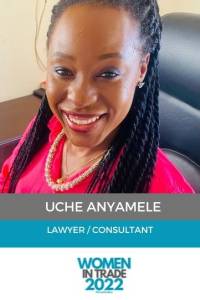
What is so exciting about being involved in trade at this time?
The prospects and potentials of digital trade and the digitalisation of trade finance are exciting. Watching how trade/trade finance practice is evolving because of digitalisation and its impact on MSMEs, especially in developing countries, makes me excited.
The possibilities with DLT based technologies, AI and Big Data in terms of access to finance are far-reaching.
I feel privileged to be a part of the global digital transformation in trade/trade finance.
I also enjoy researching the evolving legal landscape of digital trade and digitalisation in different jurisdictions. This keeps me challenged and stimulated in my career.
On IWD, what is the most important message you want to send out to young women about to start their career?
Be resilient. As a woman in a male-dominated career, you will be constantly undermined, don’t take it personally. You have to develop a thick skin and stay focused on your job, particularly if you enjoy it. Being impervious to gender bias will enable you to get through the initial stages and rise to a position of influence where you can promote gender-friendly policies.
Daniela Bonzanini | Chairman of FCI Executive Committee, FCI
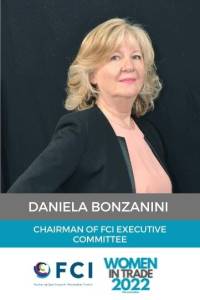
Have you encountered any related challenges in your career along the way to becoming who you are today?
I started my career in international factoring many years ago when this product was almost unknown in my country. I was lucky enough to have always been given support, by my boss, and in my private life too as my husband alway took care of his share of the family duties. This support was essential for my professional achievement.
Nevertheless, I had to meet some challenges.
In a male dominated environment, I was the only woman with a managerial position and at the beginning some of my colleagues questioned my skills.
On a personal side, I had to make sacrifices, in particular shortening my maternity leave to the minimum.
What do you enjoy the most about your job?
I enjoy meeting people from various countries with different cultures. I like studying the differences and trying to remove any barriers by looking for solutions to meet the different needs. I support education and the transfer of know-how because what we have learnt should be shared with young people in order to prepare them to take over our duties.
What’s the most important piece of advice you’d give to a woman thinking of starting a career in trade finance?
Dedicate the necessary time to self improvement. Believe in yourself.
Don’t be afraid of failing and never give up when encountering challenges.
If you want to succeed in an industry that is seen as a male environment, you will!
Natasha Condon | Global Head of Core Trade, J.P. Morgan
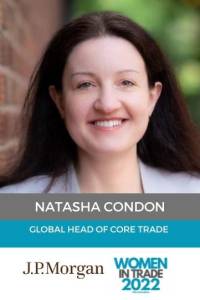
Why did you choose a career in this sector?
Like many, I fell into it completely at random. I was interviewed for a transaction services Analyst position by someone from a trade background, and he made it sound so interesting I was instantly sold.
For me, I really enjoy the sense of being directly involved in world events and getting to see ‘behind the scenes’ how the world around me works – when I walk past the shops on the way home, I know how those items got there and how the huge global trade flows function to make that possible.
Although trade finance is a finance career, you’re not just moving money around every day. You’re helping small economies get bigger, you’re helping people’s living standards gradually improve, and you can literally see how your contributions are changing the world around you.
Do you find that there is a gender gap in trade? How has this impacted you?
When I took my first job in trade, I was the only woman in the office except for the admin assistant. I think I came as a bit of a shock to them! But things have changed immeasurably for the better.
In my current role, I’m on a management team with some of the most talented women I’ve ever met in my life, and not just one or two of them either.
The challenge, as always in finance, is at the most senior levels, but there are a wave of brilliant women working their way up through the global trade finance industry and already we have some role models who have made it all the way to the top. There is still work to do, and there has been a lot written about the disproportionate effect COVID had on women across all industries; but in trade finance I do feel that we are heading in the right direction, and hopefully accelerating.
What’s the most important piece of advice you’d give to a woman starting a career in trade finance?
Stick your nose into everything!
It’s a job for the curious, for people who want to learn new things and come up with new ideas.
Companies are out there using instruments that were invented hundreds of years ago to successfully complete complex and futuristic digital transactions. Sometimes people are put off by the technical vocabulary of trade finance, but really the building blocks of what we do are very simple – and once you understand the language and the tools, you immediately realise that you can use them to achieve a huge variety of things.
You can help a manufacturer ship components to Africa to build a wind farm today, and tomorrow you can help a European retailer deliver cheap access to financing for its smallest and most disadvantaged suppliers. I really enjoy the intellectual challenge of it, and problem-solving for my clients is one of my favourite aspects of the job.
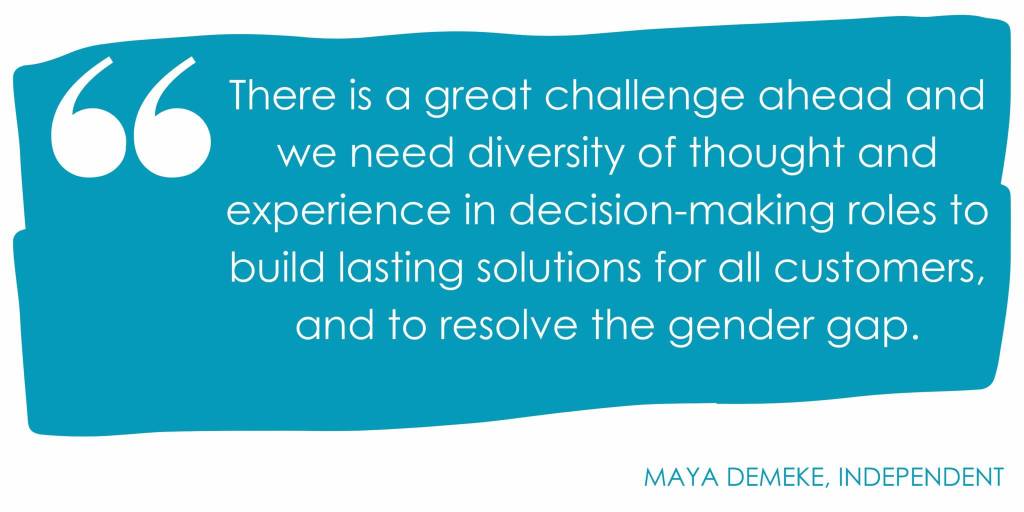
Maya Demeke | Independent Management Consultant
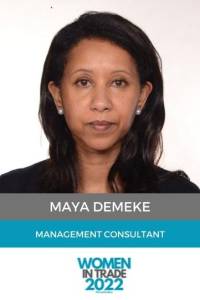
Why do you think it’s important for more women to take up a career in trade?
There are stark statistics around trade finance in Africa. As of 2021, the trade finance gap stood at $8.1BN.
The AfDB estimates that women-led firms face a $42BN financing gap, partly because women can’t access the business networks and relationship-building opportunities critical to business success that are more readily available to their male counterparts.
As a result, while 40% of SMEs are women-owned, very few are positioned for export.
It is important for more women to take up a career in trade and to participate in the building products, systems, networks and structures that resolve challenges faced by women entrepreneurs and that reflect the way they prefer to engage with financial solutions, advisory, and markets.
What is so exciting about being involved in trade at this time?
It is an exciting time to be involved in trade because there is greater awareness and momentum towards building inclusive trade practices and trade systems.
The Affirmative Finance Action for Women in Africa – is working towards expanding women’s enterprises’ access to financing through innovative financial instruments, capacity building and advocacy.
The AfDB’s 50 Million African Women Speak networking platform is linking women entrepreneurs across the continent and promoting their visibility beyond their borders; while the International Trade Center (ITC) is championing SheTrades to support their access to international markets. These are just a few of the many great programs targeting African women business owners.
The confluence of local and international actors supporting and advocating for women entrepreneurs and exporters underscores the need for women to be at the table providing trade and export finance. There is a great challenge ahead and we need diversity of thought and experience in decision-making roles to build lasting solutions for all customers, and to resolve the gender gap.
Raluca Ezaru | External Relations & Information Officer, ICISA

What is so exciting about being involved in trade at this time?
Looking around, I believe the current trade environment is changing a lot, and that’s what makes it exciting. I joined the trade credit insurance sector 2 years ago, and to me it seems like the current pandemic brought not only challenges, but opportunities too. For instance, it feels like the current environment accelerated the process of digitization.
How do we attract more women into careers within the trade / trade finance industry that has traditionally been dominated by men?
I believe in the power of example. Highlighting women from this sector will most probably make other females see themselves as successful candidates for a role in the sector.
Campaigns like this one, as well as other similar initiatives will encourage young talents to apply for positions in trade, as well as help the existing ones aspire to higher positions in the sector.
In a recent interview session called “Women in Surety” organised by ICISA, I saw several ladies talking about their experience in a sector dominated by men.
You could feel emotion in their voice, but more important, you could feel the support from other females participating in the session. I like to believe that women are supported by their colleagues, regardless of their gender, and that this comes from the expectation of being respectful towards each other.
On IWD, what is the most important message you want to send out to young women about to start their career?
We live in a time when females have plenty of opportunities, for sure more than ever.
Certainly, the future is ours, ladies!
Hannah Fearn | Managing Associate in the Trade & Export Finance Team, Sullivan & Worcester LLP
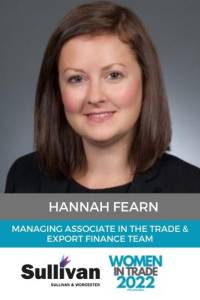
Why did you choose a career in this sector?
After completing my law degree, I secured a training contract at a London firm with a large finance practice, and so it was inevitable that a portion of my training period would be spent in one or more of the firm’s finance teams. I spent a very busy six months with the trade finance team, working lots of evenings and weekends, but I was entrusted with a high level of responsibility and had the opportunity to work on some really interesting transactions. Trade finance seemed like a good fit for me and so I chose to join the team on qualification. Twelve years later, I am still working with several of the same people from the team I joined as a newly qualified solicitor!
What do you enjoy the most about your job?
I think the sheer variety of transactions is what makes the job exciting. In a single day I might be looking at comments on supply chain finance agreement, drafting a risk participation agreement, advising on a trade credit insurance policy, answering an urgent question about a letter of credit and looking into a sanctions-related issue. I love the international nature of the job and the fact I get to speak to clients and fellow trade finance lawyers from all over the world. The international aspect of trade finance creates particular legal challenges; when working on a trade finance matter it is not possible to look at English law in isolation and we have to consider how the integration of different legal systems impacts our clients’ deals. Trade finance is very rarely boring!
In recent years I have been involved in some high-profile projects with trade finance associations such as ITFA and BAFT. We are lucky to have active industry bodies that advocate for trade finance, and it creates a real feeling of community within the sector. One of the best things about this is that there are always lots of friendly faces at networking events!
How do we attract more women into careers within the trade / trade finance industry that has traditionally been dominated by men?
At the beginning of my career it would not be unusual to find myself as the only woman in the room, and I would often be the youngest too! I would be nervous speaking up in meetings and even making “small talk” was a challenge as I felt like I did not have anything in common with those around me. This has definitely changed for the better over the last ten years, but there is still work to do.
Education and networking events actively aimed at young professionals, mentoring schemes and flexible working arrangements are all good ways to instill self-confidence for those new to the industry and to encourage more women into trade.
Lynn Galkoski | Director & Head of Trade Distribution, BNY Mellon, ITFA Board of Directors, Chair of ITFA Americas Chapter
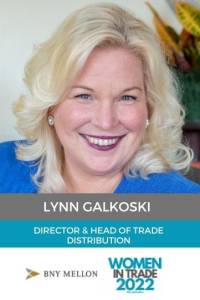
What is so exciting about being involved in trade at this time?
The extraordinary and unprecedented times in the world at the moment require strong leadership and expertise to navigate.
The dramatic shifts we have seen in the last two years (geopolitical, pandemic impact, commodity prices, transportation/ logistics issues, supply chain disruptions, currency devaluations, social tensions and sanctions) are seismic and affect every aspect of international trade.
What is exciting, fulfilling and challenging all rolled up into one is the distinct ability to make a material positive impact in the world – transaction by transaction, client by client, colleague by colleague to emerge from these headwinds and chart the path forward.
I strongly believe my international studies and business education, plus 25+ years in international trade has positioned me for this very moment in time. It is a real time master class and case study where I am honored to be working for BNY Mellon’s Treasury Services team as well as serving on the ITFA Board of Directors and as Chair of ITFA Americas.
On IWD, what is the most important message you want to send out to young women about to start their career?
There are countless words of wisdom I have learned along the way from the remarkable women in international trade.
Seek fulfillment not success.
Prioritize a diverse and inclusive mindset. Stay curious. Lead with empathy. Embrace the uncomfortable. Be passionate and idealistic yet practical and resourceful. Take risks and propel restlessness into action. Be kind.
However, by far the most important message to young women is that only you can decide what is important to you.
Embrace the ikigai concept of balance to align your ambitions with what brings you joy. This will evolve over the years due to life changes and shifting priorities (ie. career promotions, family needs, children, health, parents). Stay authentic to you and honour your purpose at any given moment in time. An energetic work attitude will fuel you to stitch together a fulfilling career tapestry of thousands of days (I am roughly on day 6,500!) where hopefully you enjoyed all of them on your terms.
Irene Gambelli | Senior Advisor – International Relations, SACE
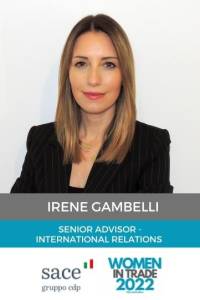
Why did you choose a career in this sector?
When I first joined SACE sixteen years ago – after a few years spent in a consultancy firm – I was not particularly familiar with the export credit industry. Indeed, this is a very niche sector, only known to players active in the field, but I learned fast how important it is in supporting global trade and economic growth.
Most of all, at the time I was eager to work in an international environment and impressed by the dynamism of this long-established company, an excellence in Italy, where thinking big was encouraged and women were already representing the majority of the total workforce, with many of them holding important responsibilities in different business areas. As I was still in my twenties, this was a great incentive to focus on my potential and do my best to achieve good results.
Have you encountered any related challenges in your career along the way to becoming who you are today?
Challenges are normal occurrences in everyone’s career advancement, either woman or man.
However, it is also true that being taken seriously as a young professional can be harder for women, due to cultural barriers like gender stereotypes that still persist in our society.
Personally, I have always tried to make my way through constant learning and dedication to work – as competence can be an incredibly powerful weapon in fighting prejudices. People around me were also crucial: I was lucky enough to find good mentors and supportive colleagues who proved to be fantastic sources of advice and a great booster for my self-awareness.
On IWD, what is the most important message you want to send out to young women about to start their career?
Naturally, there is no ‘one-fits-all’ approach when it comes to women’s own choices, motivations and self-perception around career preferences.
My first piece of advice is precisely: free yourself from the many superstructures women are induced to build since their childhood due to culture, education and social expectations.
Do not compare yourself to others but focus on your strengths to grow and improve every day, according to your inclinations and interests. At the same time, never force yourself to adhere to ‘masculine’ leadership models, by now obsolete, but rather leverage your natural empathy, interpersonal skills and emotional intelligence.
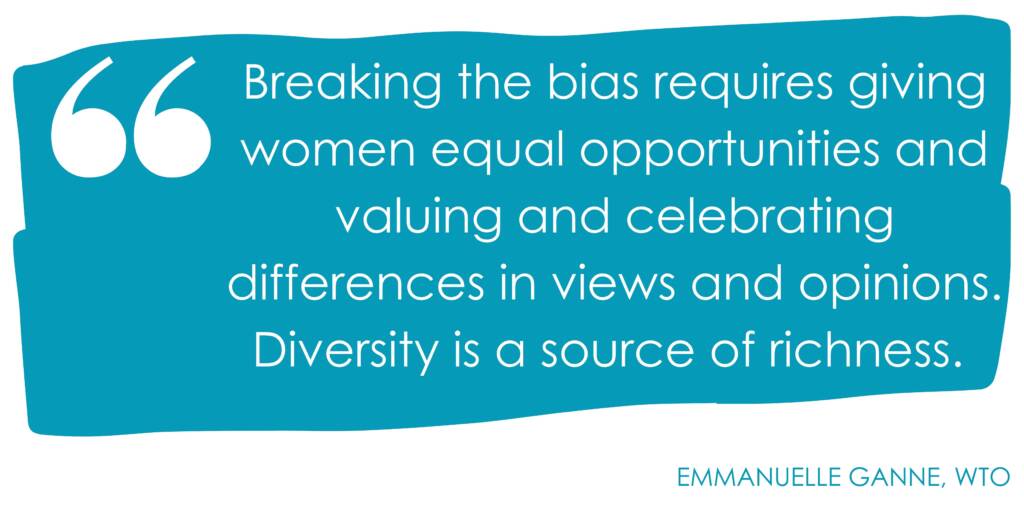
Emmanuelle Ganne | Senior Analyst, Economic Research Department, WTO
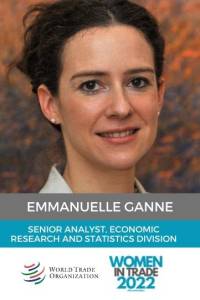
Why did you choose a career in this sector?
Trade can be a formidable engine of growth and development. I chose a career in this sector, at a multilateral level, to try and have as much of an impact as possible at a global level.
What is so significant about being involved in trade at this time?
We’re living through particularly challenging times: the Covid-19 pandemic has led to significant supply chain disruptions and threatened the lives of millions of small businesses, and accelerating the move towards a low carbon economy is becoming more critical than ever.
Trade has a key role to play in helping to build resilience and promote sustainability and inclusiveness. We need to ensure that trade benefits everybody. The Covid-19 pandemic has also brought into sharp focus the need to accelerate trade digitalization to make trade more efficient, to the benefit of all, in particular small companies.
Being involved in trade at this time means having the opportunity to drive change on all these fronts to help build a more resilient, efficient, sustainable and inclusive world.
How can we #BreakTheBias in the international trade / trade finance community?
Breaking the bias requires giving women equal opportunities and valuing and celebrating differences in views and opinions. Diversity is a source of richness.
Breaking the bias also requires demonstrating flexibility towards working mothers who may be facing constraints due to a sick child for example, and promoting a more equal division of household chores.
Sarah Green | Law Commissioner, Law Commission of England and Wales

Why did you choose a career in this sector?
I didn’t really. I always say that my career has been a series of happy accidents and that’s true!
I studied Law at university, and then became a software developer for a while, so when I returned to law, I had a strong interest in the legal implications of developing technologies. Those implications are particularly significant in the trade sector, so here I am.
Have you encountered any related challenges in your career along the way to becoming who you are today?
The trade world is definitely still one in which, in my experience, women have to do more than men to achieve the same results and to reach the same levels.
There have also been, and continue to be, unfortunate presumptions made about what people who occupy certain positions must look like. I have very much enjoyed my career to date, but there have been far too many instances in which I have been invisible simply by virtue of being a woman.
I am still surprised by the amount of (usually passive, not nonetheless still damaging) prejudice about what women are capable of, and of the relative importance of their contributions.
There are times when I have to prove my worth twice: first through the quality of my work, and then through being able to dispel the idea that I am not as equal to the task as a man.
On IWD, what is the most important message you want to send out to young women about to start their career?
To be resolute in the face of any challenge to your worth, and not to let your self-belief be adversely affected by the way that others treat you. You know you better than they do.
And to be as supportive to others as you can: spread the love.
I can’t say it better than Kipling did: “the strength of the pack is the wolf, and the strength of the wolf is the pack….”
Argjenta Islami | International and National Payments Specialist, BPB
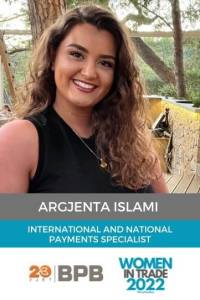
What do you enjoy the most about your job?
Being able to have a real impact on the economy, especially that of emerging markets, makes me enjoy my work more and more each day!
Providing goods and services between parties involved in international trade is vital to ensuring a healthy economy.
In addition, for me it is another continuing pleasure of living a “fast-paced, constantly challenging career” that is continuing to make me more prepared to deal with economic change every day in real time.
So, once I knew how powerful this industry is, I knew how powerful even my career will be, and that’s why I am looking forward to getting more professional training and development opportunities.
How do we attract more women into careers within the trade / trade finance industry that has traditionally been dominated by men?
The impact that professionals working in Trade Finance have is sometimes not properly communicated to everyone.We as a society have a mission to be the best example for a woman to be able to join the trade finance industry. Not only formal involvement, but also to being part of the changes and the flow of trade in general.
We should be the ones who think about which methods to attract.
So, to name just a few: Awareness campaigns of the benefits of this work, compiling a long-term integration plan for the next generations and most importantly to enable some certifications and training from credible institutions more affordable financially or distribute scholarships.
Gaynor Jeffrey OBE | Deputy Director, Digital Trade and Telecoms, Trade Negotiations Group, Department for International Trade (DIT)
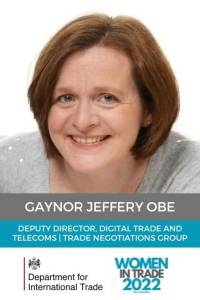
What do you enjoy the most about your job?
My job in trade policy is a really great blend of economics, law, policy and international relations, and as I work on digital trade, it’s also at the boundaries of technology and how technology changes the world around us.
I love the challenge and the stretch – we’re constantly pushing boundaries and thinking about new approaches and new issues.
It’s very rewarding and every day and every conversation is different. I don’t like to rest on my laurels and this job certainly doesn’t allow any of that!
What is so exciting about being involved in trade at this time?
For me this is a hugely exciting time to be involved in trade as the UK builds its independent trade policy. We have the ability to be more innovative in our approach and make a real difference.
We’re involved in work that is quite ground-breaking. And in this world of technological change and increasing globalisation, the work we do on digital trade can really help businesses to trade and grow.
I love being part of creating opportunities and building the prosperity that can come from that.
How do we attract more women into careers within the trade / trade finance industry that has traditionally been dominated by men?
I think changes in the way we have had to work during the pandemic are really helpful here. A barrier for me personally was managing international travel at the same time as being present at home for my family. Working through online platforms has made that balance so much easier to manage – the hours may be unsocial if you’re negotiating with Asia Pacific, but now I can do it from home and still be here for my children when they come back from school.
I think we have a real opportunity now to attract talent from groups of people who were previously put off from careers in international trade by the travel commitments. We should be mindful of that opportunity as we get back to more normal ways of working – and not just drift back into the ways business was done in the past.
Elitza Kavrakova | Head of Institutional Clients East, Raiffeisen Bank International AG
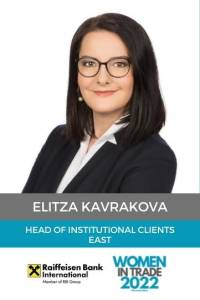
Why did you choose a career in this sector?
It was rather a coincidence that I started my banking career in the trade finance area. And, remembering my start, I needed to jump right away into the daily business of the bank guarantees team without having much time to learn the theory.
It fascinated me right from the beginning with the combination of internationality, contact with internal and moreover external clients and the chance to gain a vast knowledge in topics which you would not learn that way at university.
Years later, I am on the sales/relationship side, however trade finance remains an anchor product in my portfolio and close to my professional heart.
What is so exciting about being involved in trade at this time?
Trade has always (and not only now) been one of the most interesting areas in finance due to its dynamics and the fact that it is connected to the real economy.
It is not just the documents you check, the LC you confirm, but behind that there is a vessel or a truck waiting at the border to deliver real and necessary goods to people. It is not artificial and synthetic.
I guess as well, that my fascination for the product was awoken by my first boss – Dr Andrea Hauptmann, one of the very well known and most prominent trade finance ladies in Europe and beyond.
On International Women’s Day, what is the most important message you want to send out to young women about to start their career?
No need to be shy. Show what you can. Speak out your opinion.
You will never know it, if you do not try.
Last but not least – you cannot be everybody’s darling – so do not even try it.
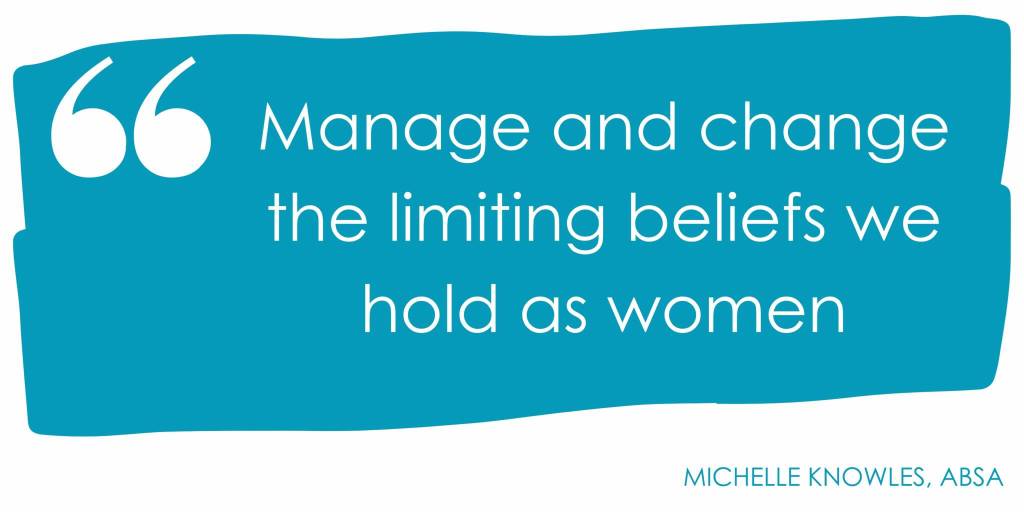
Michelle Knowles | Africa Council Co-Chair, ABSA
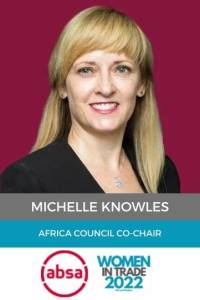
What is so exciting about being involved in trade at this time?
Access to Trade Finance products is fundamental to the growth of international trade, which is a key enabler to economic recovery and growth.
There are many regions and countries that have been able to lift their people from poverty to prosperity through trade.
We will see several new challenges and opportunities emerging in Africa’s trade over the coming months and years.
The African Continental Free Trade Area is intended to remove several significant barriers to intra-Africa Trade, creating a large market for firms across the region.
Alongside this we see the fundamental changes COVID caused in global supply chains and the region’s trade with the rest of the world as well as the drive for digitization in the industry to ensure greater inclusivity.
We anticipate that once the crisis recedes, the need for financing to reenergize the region’s trade will be higher and more urgent than ever.
It is a fantastic time to be in trade and to be part of the existing dynamic journey that is currently underway- one that I can only describe as transformational.
What’s the most important piece of advice you’d give to a woman thinking of starting a career in trade finance?
The most important piece of advice to any woman thinking of starting a career in trade finance or any other industry is to manage and change the limiting beliefs we hold as women.
We all create our beliefs based on the way we see the world. Some beliefs are enabling and functional. Others limit our potential – we are not ready for a role, or we can’t take on a career in a specific industry.
Our beliefs determine our success and happiness in life so my advice to all women out there is that to reduce or overcome self-limiting beliefs you need to be aware of and recognize just what the self-limiting belief is and when and why it is holding you back.
You will be surprised at how doing this starts to change your frame of reference and challenge the beliefs you have about yourself and how you can then start to reframe this into a positive response.
I wish you all every success going forward and look forward to seeing many more women in the Trade Finance industry.
Angela Koll | Senior Business Expert for Trade & Supply Chain Finance, Commerzbank
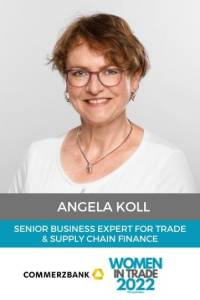
What do you enjoy the most about your job?
Getting in contact with colleagues and people all over the world to discuss new opportunities and innovation in the trade finance space.
I very much enjoy networking to exchange experience, to talk about new solutions and visions in trade being supported by new technologies, enhanced use of digital trade data and open mindsets of involved parties.
What is so exciting about being involved in trade at this time?
Having worked in trade finance for more than 30 years, I have experienced that evolution in trade, slowly starting to allow digital product solutions and innovative concepts of using trade data and new technology.
Due to my work in a trade finance blockchain project and participating in workshops of institutions like the ICC, I feel very excited and privileged that I can contribute to shape the future of trade.
On IWD, what is the most important message you want to send out to young women about to start their career?
Curiosity and interest are the best drivers for starting a career.
Do not hesitate to walk through open doors, be courageous and excited in what you are doing, be prepared for challenges and do not give up easily.
Tasneem Krueger-Vally | CEO, KruegerVallyConsulting
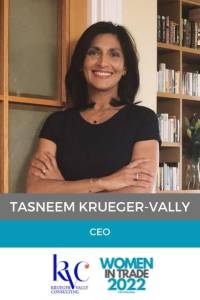
How do we attract more women into careers within the trade / trade finance industry that has traditionally been dominated by men?
My experience is that the industry has become much more inclusive than when I started my career. However, at the more senior level, I still don’t see much female representation. There are various things companies can do to attract the best talent when competing with other sectors such as technology and then retaining talent that they have invested in. At the London Trade Roundtable, our mission is to provide an informal network for individuals interested in and working in Trade, attract and retain diverse talent in trade, and create opportunities amongst our members for employment.
Companies seeking to attract more women into Trade, should consider:
- Prioritising productivity over presenteeism
- Equalise pay. Men and women doing the same job at the same level should be paid the same
- Where possible, companies should do more to assist with childcare, example on-site creches, better parental leave programmes, and facilitating women to return to the industry if they have taken time off to care for their families
On IWD, what is the most important message you want to send out to young women about to start their career?
- Work hard but maintain balance in your life
- Learn from as many sources as possible. Mentorship is great, but you can also be your own mentor by choosing to seek out skills that people senior to you, at your level and junior to you excel in and try to adopt those
- Don’t be afraid to use your voice. Everyone around you wants to hear your opinion, wants to have you contribute, otherwise you would not have been selected to be part of the team
- Don’t expect recognition either in the form of remuneration or promotion – state your case and evidence it through your contribution and accomplishment. Its not uncommon that the person getting on getting the job done effectively and efficiently gets overlooked
- Don’t be afraid to take on a new task just because you think you don’t have the skills or have not done the job before. These are self-limiting perceptions. Find your edge in everything you do and move beyond it. This is the only way we grow
Anastasia McAlpine | Head of Product, Trade & Supply Chain Finance, Finastra
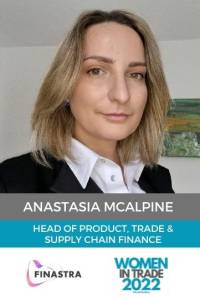
Why do you think it’s important for more women to take up a career in trade?
Trade is an exciting and tangible field that touches our everyday life. Whether you are thinking
of buying a box of teabags or a new car, all these things have been part of the trade ecosystem. A career in Trade and Trade Finance can offer the chance to work with amazing, highly diverse individuals worldwide, gaining unique insights into businesses and how things are made. It is also an opportunity to make a difference in the world and help businesses, communities and
people thrive.
Do you find that there is a gender gap in trade? How has this impacted you?
Throughout my career I was lucky to be surrounded by likeminded individuals, women and men, and I’ve met great mentors who guided me on my journey. I have always felt empowered to speak my mind and to be heard, but could it have been easier sometimes? Looking at representation in the industry generally, I do believe there is a gender gap especially at senior levels and I look forward to welcoming more women to add their professional perspective, talents and skills to help drive the Trade industry forward.
How can we #breakthebias in the international trade / trade finance community?
I think it is so important to appreciate everyone for the unique individual that they are, their
experience, their perspective and the insights that they bring to the table. This allows us to
move forward in an all-encompassing, inclusive way. Let’s expand our minds to move past
gender stereotypes and prejudice together.
Adeline McNary | Head of Marketing & Communications, Contour

What is so exciting about being involved in trade at this time?
It has never been more exciting to be in trade. The industry is undergoing a dramatic transformation as key players recognise the urgent need to embrace digital innovation.
Being with a leading fintech that is driving this change and reshaping how the industry traditionally interacts and operates, means everything we do – through digitisation – is bringing about impactful change.
Contour was formed right at the start of the pandemic when all the shortcomings of this paper-heavy industry were greatly exposed. Today, we have become an enabling force of the industry’s transformation as we sit at the intersection of technology and trade.
As more mindsets change and more players adopt digitisation, the time has never been better to be in trade.
How can we #breakthebias in the international trade / trade finance community?
It is no secret that the trade and trade finance community has long been dominated by men. However, this is changing through the advancement of digital technology.
New opportunities have been created, allowing more women to pursue careers in the industry with diverse skill sets in less traditional trade roles.
As long as the industry continues to shift towards a digital environment, doors will open to more women who want to play a role in the industry’s transformation.
We also need to make a conscious effort to foster a more inclusive culture by supporting, celebrating and advancing women in our workplaces.
I am thankful to be in a workplace where the value women bring is recognised and rewarded.
On IWD, what is the most important message you want to send out to young women about to start their career?
Do what it takes to nurture and develop your strengths. Once you have a clear vision on what that is, dedicate your career towards maximising that potential.
Your career is not going to be linear but your strengths should underpin each new opportunity and allow you to build on the successes of previous roles.
Also, it is important to operate with empathy and kindness. Research has shown that empathy is the most important leadership skill today. By listening and understanding the perspectives of your co-workers, you will earn their trust, engage with them better and at the end, achieve better results.
Dr Maria Mogilnaya | Principal Banker, Trade Facilitation Programme, EBRD
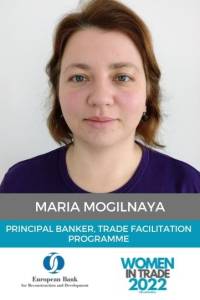
What do you enjoy most about your job?
What I enjoyed most about my job was being able to innovate and challenge the stereotypes I meet along the way. Working at a multinational development bank like the EBRD meant I could conduct ground-breaking work (some days, not every day, of course). It also meant working with inspiring women (and men) across the EBRD regions.
For example, I really enjoyed innovating with two amazing women at Armswissbank and TBC Bank. After three months in the making, we managed to come up with a pioneering cross-border factoring transaction, combining the FCI’s two-factor arrangement with a risk mitigation guarantee provided by the EBRD. As Thomas Edison said: “There is a way to do it better – find it.”
Having these eureka moments and pursuing them to get a tangible result is what brings me the most joy!
What is so exciting about being involved in trade at this time?
I have been working in the area of green trade finance for more than six years and, since the start of the pandemic, I have also been working on digitalisation through collaborations with several providers of digital trade finance solutions.
Having caught the green and digital bug after 11 years at the EBRD, I am thirsty for more and plan to pursue my (professional) dreams outside the EBRD, squarely at the intersection of technology and sustainability in trade and trade finance.
I know that the future of trade is green and digital. These two areas are converging very quickly and there is no turning back. Sustainability (and, specifically, green trade finance) requires data and technology, so transitioning to paperless trade is a must if we want to truly tackle climate change. This is why it is such an exciting time to be in trade and trade finance right now.
Do you find that there is a gender gap in trade? How has this impacted you?
When I joined the EBRD in early 2011, its Trade Facilitation Programme largely comprised women. Someone told me that this was because women were generally more client-oriented, had more patience and paid greater attention to detail. At the time, I did not know whether this was true. Was it a stereotype? Over the years, I noticed that there were, indeed, many women in trade finance, especially among junior and mid-career professionals.
Oxford Learner’s Dictionaries define a stereotype, originally a French printers’ term, as ‘a fixed idea that one has of a person or a group of people (or thing), which is often not true in reality.’
So let me break a stereotype here – I think trade and trade finance needs more men, especially at junior level, so that the workplace becomes more diverse and, thus, more inclusive. We need to strive for balance in the workplace, where different views are valued and celebrated.
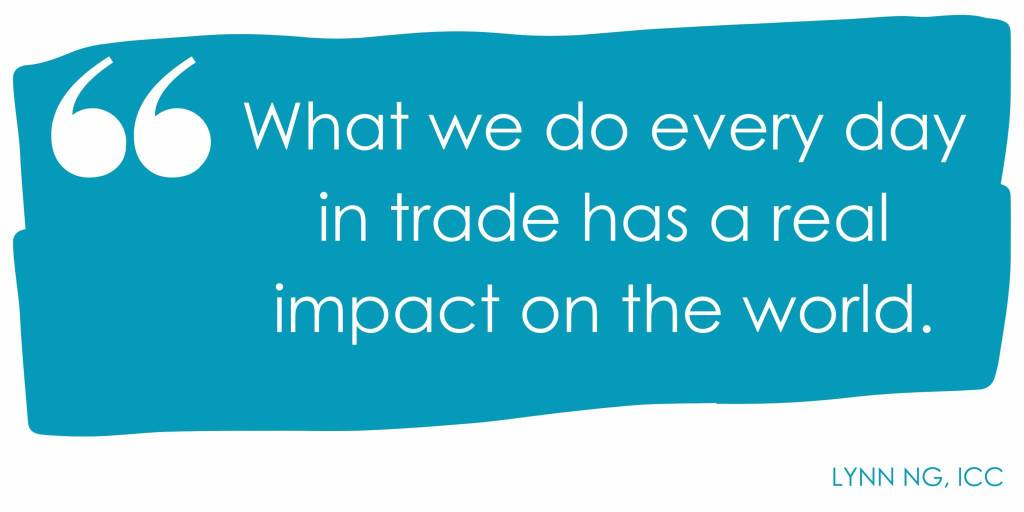
Lynn Ng | Chair, ICC Banking Commission
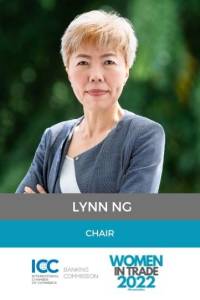
Why did you choose a career in this sector?
A world where natural resources are found in one location, but mostly consumed elsewhere creates the fundamental need for mankind to collaborate and to exchange. Trade is a powerful enabler.
When performed responsibly, trade brings out the best in humanity. Allowing us to share and progress together. It facilitates investments in logistics, education, medical infrastructure that benefit the communities, helping to reduce the gap between the ‘’haves’’ and the ‘’have nots’’.
Yet, when carried out with the wrong motives, trade exploits and abuses.
What we do every day in trade has a real impact on the world.
I am proud to be part of organizations that share these values, and that see it as our role to defend and promote the use of trade responsibly. In today’s context, this is even more important. Let us continue to push, encourage, and challenge each other towards higher moral standards.
What is the most important message you want to send out to young women about to start their career?
The only boundaries to what you can achieve are those that you set for yourself. Just focus, taking one step at a time.
Yes, you will have to juggle many things in life, and might have to make compromises, but stay true to your values and your integrity. For these, there can be no compromise.
Lorna Pillow | SVP, London Forfaiting and Deputy Chair, ITFA
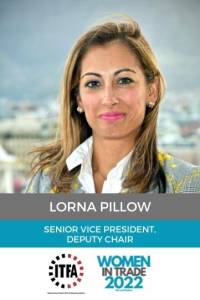
Why did you choose a career in this sector?
Surprisingly, I did not choose a career in Trade Finance. It was a mere coincidence. As a young professional I soon came to realise that I enjoyed a hectic, dynamic environment.
I live on the small island of Malta and was keen to start a family at a young age, hoping that I would also be able to juggle a successful career. During my job search, I read on Bloomberg that one of the Banks had hired a pioneer expert in forfaiting, so I sent my CV and the rest is history. Having said that, it was one of the best decisions I have ever taken.
I came to realise that the beauty of trade is that it is zestful in that you support actual transactions, not to mention meeting so many different people from all walks of life.
Moreover, I became fascinated by emerging markets, although I must admit, it was a natural transition since my thesis a few years before tackled the Tiger economies.
Have you encountered any related challenges in your career along the way to becoming who you are today?
Challenges are part and parcel of life and we would not be who we are, were it not for those hard times, irrespective of gender.
The first obstacle I faced hit me like a tonne of bricks when I realised that I would not be sitting in the head office. This meant that I had to build a team, take various initiatives, understand and adapt to different cultures, ensure that the quality of work was to the highest standards, all while trying to go through an intense process of self-teaching.
Shortly after joining the company, I was pregnant with my first child and that indeed did bring along some sleepless nights not only for obvious reasons, but also until I could regain enough self-confidence to believe that this situation was something that I could master. I was fortunate to have been surrounded by a very supportive mother who always thought that my sisters and I should decide our own path. All those teachings came in very handy when dealing with obstacles.
Those initial years were particularly hard as I juggled to establish the much talked about ‘work life balance’. Unfortunately, there is no perfect balance, but the earliest one realises that the objective is simply to try and be the best one can be, both at home and at work while remaining true to oneself, to one’s goals, ambitions, then that much needed serenity that one longs for, becomes more attainable.
I must acknowledge that in my case, this has come along with the experience of witnessing my children grow and slowly spread their wings while I was also able to ride high as a result of all the hard work accomplished both at home and at the office.
How do we attract more women into careers within the trade / trade finance industry that has traditionally been dominated by men?
The first step is attracting the young generation, through a meaningful education, to be part of this evolving world.
Hiring enthusiastic personnel who are eager, passionate, and ambitious is key. We have heard that skills can be taught, but we must never forget that work ethics too are fundamental in ensuring success.
We are fortunate to be living during an era with so many female role-models. However, this can also work against us as there may be too many expectations of women.
Ultimately the important point to realise is that we are all very different and unique in our own way and therefore, we may want to achieve different things. Supporting women who desire a career in trade finance is imperative both in their personal life as well as at their place of work.
Thankfully, several initiatives are already in place in various institutions. I strongly believe that women need to have access to a reasonable amount of flexibility if they so require, especially in their children’s early years.
Véronique Rapetti | Board Member, Vice President, OWIT UK
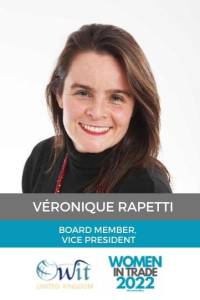
How do we attract more women into careers within the trade / trade finance industry that has traditionally been dominated by men?
I think it all starts from the beginning, i.e. how can we share information, exciting news, success stories about this sector to women from early stages of their professional life or while they are making choices during their education?
We need to highlight the incredible women that are already in this sector, and help them become ambassadors across various women networks to create awareness, education, mentoring opportunities.
There needs to be more job fairs that explain the various roles, responsibilities and exciting career prospects available in this sector, and more free resources for people to learn and get insights.
On IWD, what is the most important message you want to send out to young women about to start their career?
First of all: believe in yourself, and if in doubt… just go for it.
There has never been a better time to join the International Trade sector and you need to think of the industry itself and all the adjacent industries that also support this sector.
As a first step: why don’t you reach out to people who inspire you and ask them for an informal chat. We are all passionate about this sector and I am sure we would love to help you in your decision making process.
Alexandra Renison | Head of Strategy and Delivery, Trade Advocacy, DIT
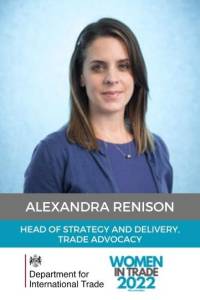
What do you enjoy most about your job?
The variety and the extent to which trade is really about people means I am never ever bored in this field and on a constant learning incline. While silos exist everywhere, I find that trade covers such a multitude of areas and disciplines – from policy and practice to customs and regulation – that every day is a school day; there is constantly someone else to learn from and enhance your skills.
What I have probably enjoyed most is that I have been privileged enough to operate in the nexus between business and government, meaning I can actually see the interplay between what policymakers do and how that gets translated into the real world
What is so exciting about being involved in trade at this time?
We are living in real time where the role of trade is under scrutiny like never before. Some parts of the world are choosing to see trade as a fault – I’m very excited and proud to be part of a place that sees it as a fix rather than a fault.
How do we attract more women into careers within the trade/trade finance industry that has traditionally been dominated by men?
I fell into my trade career, and that has allowed me to see how easy it is both for things to always continue as they have been but also how easy it can be to break the mould so to speak.
So I think it’s a combination of making sure young women see the role models that I never really had in this field, and understanding their stories – as well as demonstrating that there aren’t areas where women can do better or worse (because that can perpetuate stereotypes about careers that are and aren’t for women) but rather fields where their skills can be honed and shaped with the right mentoring.
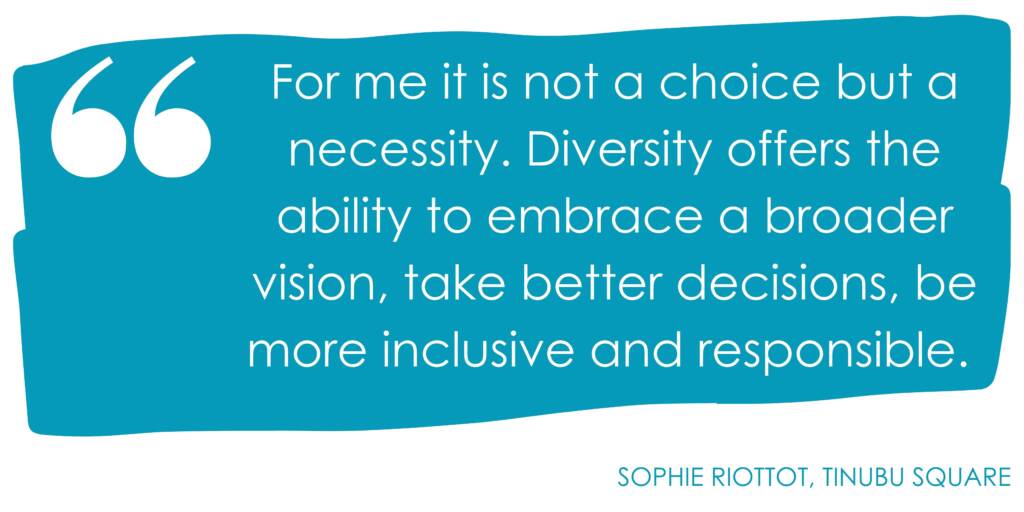
Sophie Riottot | EVP Chief Revenue Officer – EMEA & APAC, Tinubu Square
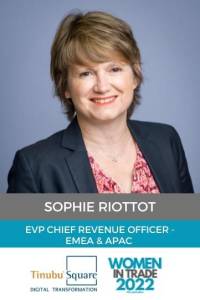
Why did you choose a career in this sector?
I did not precisely choose a career in Trade Finance, I would rather say that we met each other a few years ago at a time when digital transformation of the trade credit industry started to be instrumental for the future of this industry.
I have a long career in the Software and technical industry with a specialization in Finance. I have seen with Tinubu the unique opportunity to bring my experience to the trade credit and surety industry within a company able to offer the best of the two worlds : cutting edge technology and business expertise to the benefit of our customers.
In your opinion, why is it important that more women take up trade as a career in the near future?
I come from an industry which used to lack gender diversity in the past but has successfully managed to evolve for the success we are all aware of.
For me it is not a choice but a necessity. Diversity offers the ability to embrace a broader vision, take better decisions, be more inclusive and responsible.
It not only benefits the industry but opens a greater perspective for the future. As a leader I consider it as a duty and a chance to bring more women into the Tech and Trade Finance industry globally.
On International Women’s Day, what is the most important message you want to send out to young women thinking about their careers?
We leave more than ever in a time of uncertainty, particularly affecting women in many countries all around the world. This is why I would like to bring a message of hope and purposefulness.
The trade finance industry opens great opportunities in many countries all around the world and is still at the verge of an important digital transformation that will bring opportunity for women willing to participate in it. Please join us!
Diana Rodriguez | VP, International Policy, BAFT
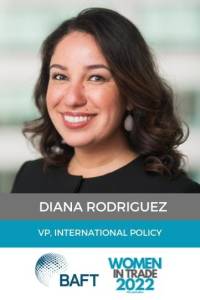
What is so exciting about being involved in trade at this time?
For the first time in my career, discussions about trade and supply chains are a part of everyday conversations for policymakers and citizens alike. While this heightened awareness comes as a result of supply chain disruptions, it also serves to highlight the importance of the work that we do day in and day out to facilitate global trade.
It is an exciting time of change for the industry and we are at a critical inflection point. Trade digitization that seemed to be impossible only a few years ago could now be within reach.
Sustainability is transitioning from a buzz word to a core priority for our business. The industry continues to work toward remedying the enduring trade finance gap so that SMEs are able to obtain much needed trade finance. Meeting these challenges will take work, but will yield more enduring and sustainable growth in global trade.
This is not the trade finance industry of yesteryear. Our industry is transitioning quickly and it is exciting to be a part of shaping that change.
What’s the most important piece of advice you’d give to a woman thinking of starting a career in trade finance?
The trade finance industry is evolving quickly and it requires new entrants to the business to share new insights. Leverage the diverse experience that you bring to trade finance. Immerse yourself in the subject matter and seek to understand the issues you are working on from multiple perspectives.
Learn from your peers and seize opportunities for leadership both within your institution and with your peers through your participation in industry associations. In my five years with BAFT, I have found the industry to be remarkably collaborative. Many have commented on the value they derive from networking with peers and contributing to the development of the industry.
As you consider a career in trade finance, take ownership of what you want out of your life and strive to create a career that fits into that vision.
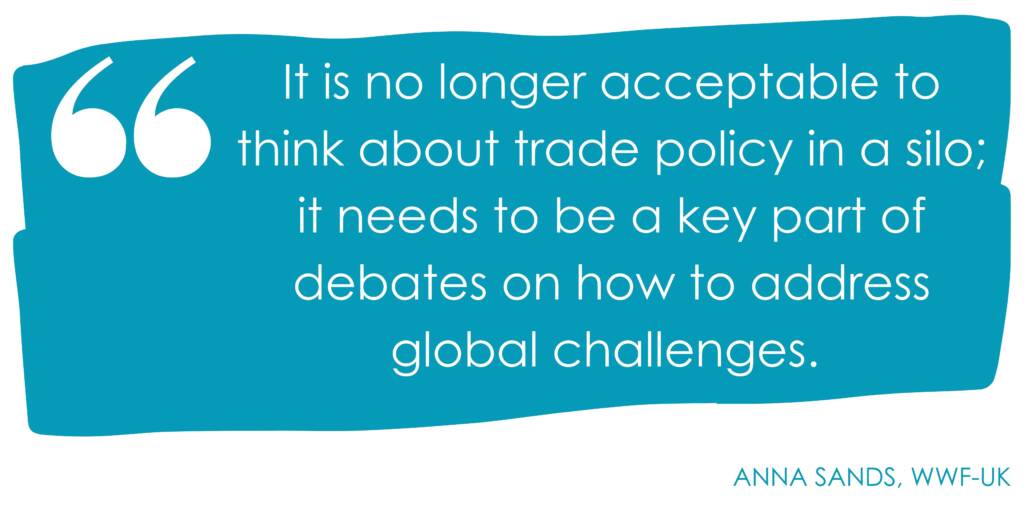
Anna Sands | Senior Policy Advisor (Trade), WWF
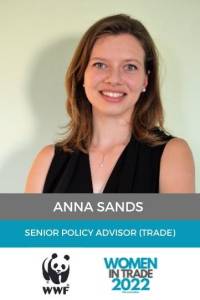
What is so exciting about being involved in trade at this time?
The world of trade is undergoing fundamental changes, and there is an increasing recognition of how trade interacts with other key areas of policy, such as environmental and climate change policy, and human rights.
It is no longer acceptable to think about trade policy in a silo; it needs to be a key part of debates on how to address global challenges.
Finding our way out of the climate crisis relies on us integrating environmental and climate change policy into how we do trade and investment globally- which is why it’s so fascinating to be a trade expert today.
Why did you choose a career in this sector?
I think it’s a key moment for changing how we think about and design trade rules, which is why I wanted to work in this area. Finance is already seeing a massive shift as private and public bodies are recognising the need to include environmental, social and governance considerations.
The same will need to happen to trade policy, and I want to be part of bringing that about.
Orit Shriki | Project Manager, Surecomp
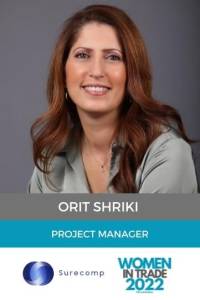
What do you enjoy the most about your job?
As a woman who works for a trade finance software company and collaborates regularly with banks and corporates around the world, my view is that – although women are still under-represented across the industry in general – it is a fantastic industry to work in and I truly value the perspective and opportunities it affords me.
Trade finance is an international domain that is rapidly evolving at an unprecedented pace. Having worked in it for more than 25 years, I’ve never seen such an accelerated appetite for digitization and working for a technology provider, this of course means we are at a pivotal time in our evolution. I’ve taken roles in a variety of areas across the business, always learning and acquiring new skills. Trade finance has allowed me to grow and develop into the woman I am today, and it continues to provide me with new and exciting opportunities.
I’ve been fortunate enough to travel all over the world working with clients for example in Vietnam and Thailand, France, Germany and America. I enjoy working in a global industry where I need to be culturally, economically and politically aware and I feel proud to be contributing in my own small way to facilitating seamless and sustainable global trade, which promotes ongoing economic growth and collaboration.
Have you encountered any related challenges in your career along the way to becoming who you are today?
Probably the biggest challenges came with a lack of knowledge and experience in my earlier years. I was very young when I joined Surecomp, I hadn’t travelled much, I lacked confidence and really had no idea about the world of trade finance. All these factors, coupled with being a woman in a very male-dominated environment, meant it was a daunting time and I had to face challenges head on. I couldn’t allow myself to stand still.
Soon after I was married, I took a client assignment in Portugal for 3 months which forced me to grow stronger, both personally and professionally. I became more independent, I learnt quickly and I gained confidence that I was able to deliver what the client needed. After that trip, the fear that I wouldn’t be good enough was allayed and thanks to Surecomp putting its trust in me, I’ve never looked back.
A career in trade finance has not only nurtured my strengths, given me a wealth of amazing experiences, exposed me to interesting people and places, but it has challenged my weaknesses; it has pushed me forward, sometimes faster than I would have liked, but in the end I’ve succeeded and I’m a better person for it.
What’s the most important piece of advice you’d give to a woman thinking of starting a career in trade finance?
I would advise any woman, or man starting out in this field to study, to understand the subject in depth to gain strength in knowledge. Global trade and trade finance technology is quite complex, and it’s important not to be afraid to confront your aspirations.
The climb may be gradual, but don’t give up and particularly for women, the future is now, there are no limits to what can be achieved. We are seeing more and more women take up senior leadership roles in banks, corporates and technology firms like ours, so the opportunities are there, you just need to be confident and grab them with both hands!
Susan Starnes | Head of Strategy, Trade and Commodity Finance, IFC

What is so exciting about being involved in trade at this time?
Look around you right now – what is around you while you read this article? So many goods that were made somewhere else. So many people have been involved in getting to you that coffee mug, coffee, iphone, desk chair. Over 130 million containers are in motion today on container ships alone.
Every ship transports countless goods that have already made lives better – wages, business growth, innovation practice. Representing the stories of all those involved in creating and moving what is inside. And they are headed somewhere – these goods, collectively and over time will help someone.
Life sustaining food and supplies. Innovation launching inputs. Infrastructure building materials. Technology. Even consumer items that bring a little joy.
If you ever question the excitement of being a part of this globally integrated activity, just scan the descriptions of trade transactions that you have supported.
Think about where things are going – who will receive them and what they might do. Today, it is clear that trade is instrumental for post covid recovery. Trade shifts development trajectories of entire countries. And so much of what happens in the world directly affects trade.
Meanwhile, especially now, trade is a balm for countries in crisis – as people face unimaginable challenges, we are part of the mechanism that is best-placed to soon help them survive and return to thriving. Excitement about being a part of global trade – that never disappears.
Why do you think it’s important for more women to take up a career in trade?
Over the past several months, I’ve had the pleasure to speak with several emerging market bankers about access to trade finance for women owned or led businesses. I’ve heard some indicate that cross border trading tends to be dominated by men.
They note challenges of investing trade finance, given this dynamic. And yet, the industry is actually teeming with female entrepreneurs – often heads of small or micro businesses – that face limited to no access to trade finance. Yet, they continue to work, to strive to overcome this and other challenges – incredible resilience among this high potential market segment.
We are seeking to address such asymmetries of market views. Who better to lead this effort than women financiers? I am fortunate to know many strong, intelligent, effective women in the trade finance space – many of whom are colleagues or clients of the IFC. I am fortunate to work with exceptional colleagues of both genders.
I find that everyone brings integrity, inspiration, focus, and commitment to their jobs. We have a fairly even split among the two groups, and I believe that this contributes to high performance. It contributes to an esprit de corps possible only with mutual respect and the capacity to honor others’ strengths across diverse backgrounds and characteristics.
On International Women’s Day, what is the most important message you want to send out to young women about to start their career?
I am so excited for you and your journey. You are full of energy and brilliance. You will move through your future with a strong work ethic, integrity, curiosity for markets and people around you. And compassion. You will find your tribe – those people you believe in you and will give you the direct feedback that we all need sometimes.
The world is a fascinating place – there are core fundamentals that don’t change, and there are elements that transform quietly over time to surface seemingly overnight. You will find your place – where your talents, passions and values intersect. Your brain will become an amalgam of everything that everyone you meet has tried to teach you.
You will bring forward this unique collection of knowledge – along with some fabulous ideas of your own – that will make the world a better place. Don’t stop looking for that place – the place that you will help to elevate.
Georgina Stevens | Trade & Working Capital Analyst, J.P. Morgan
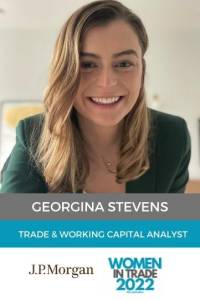
What is so exciting about being involved in trade at this time?
As a new entrant to the realm of Trade, I can say with certainty that there could not be a more exciting time to be involved. My enthusiasm for the world of Trade can be summarised with three key words: innovation, opportunity & materiality.
It’s widely accepted that the Trade Finance ecosystem faces significant challenges, and who, when first beginning their career, wants to enter an industry that’s in the midst of recalibration?
Digital innovation is driving financial and commercial services, but it can be argued that Trade has been outpaced. That said, every challenge presents an opportunity to succeed. In navigating the digital revolution, there exists a multitude of not only exciting, but often highly sophisticated and complex problems to sink your teeth into.
Along with Digital innovation, the ESG conversation has started to become really interesting. I believe that ESG is of paramount importance and should be at the crux of the innovation transforming the industry. Innovation touches every corner of Trade and it is an exciting time to be engaged with such a fast-paced subject.
The global interconnectedness of Trade has also afforded me significant opportunities on a personal and professional level, as well as being one of the most compelling parts of the industry. I have recently relocated from London to Hong Kong; to kick-start my career in a truly globalised business on an international assignment is an experience (and welcome challenge) that few other industries offer.
A senior female leader once told me that ‘Georgina, we are all our own compasses’ – and that this, along with a desire to turn concept into action – will only ever lead to positive experiences.
Our job is not just moving money but moving the goods and services that are building and connecting the world around you. The very nature of our business being so diverse allows the chance to have a material impact, including incentivising equality.
How do we attract more women into careers within the trade / trade finance industry that has traditionally been dominated by men?
I think the most useful way I can answer this question is by providing a little insight into why I chose to join the industry:
Firstly, I’d like to point to the importance of leadership and mentorship. At J.P. Morgan, I have been lucky enough to join a Team where the sheer line-up of women is extremely impressive; particularly the fierce dedication to work they exemplify and the vast amount of leadership positions they hold across Trade & Working Capital and Payments more broadly.
Secondly, I’d like to highlight another key factor – attitude. I have been surrounded by inspirational management and team members who display a wealth of knowledge and high energy, motivation, approachability and above all, show a genuine enjoyment of their job – to see someone love their job so fervently is a reminder of the reward and joy that work can bring.
Finally, I will touch on recognition. I recently took part in ITFA’s Emerging Leaders competition. As the phrase goes, ‘corporates need carrots’ to be incentivised – but it goes without saying that this can also be applied to employees. Being recognised by the industry for an innovative idea is key to attracting people into the industry because it proves that young and diverse voices can and want to be heard (including receiving negative feedback). This is a motivating force to continue to want to innovate, improve and succeed. It is important to also note that recognition can be in the smallest forms – a smile and a thank you often goes a long way.
Louise Taylor-Digby | Head of Global Trade Strategy, SWIFT and Vice Chair, ICC Commission on Banking
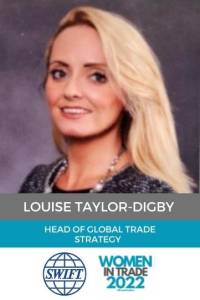
Have you encountered any related challenges in your career along the way to becoming who you are today?
More than I can count. I’ve transitioned continents, business/product lines, disciplines and industries and most importantly into parenthood. With each step, I’ve faced different challenges.
But I haven’t solved these challenges in isolation. I’ve had the privilege of working with mentors and professional coaches whom I’ve had immense respect for. I think it’s also important to build a network of subject matter experts. Particularly in trade as it’s not unusual to need to jump between macro-economics, legal, tech, finance, and financial crime – and sometimes all at once.
At the same time, and this may sound like a cliché – we also have to recognise that we cannot control everything that happens, but we can control how we react to changes that come our way. Even when the challenge is seemingly overwhelming, one should look into how the challenge can be reframed as a growth opportunity instead.
What do you enjoy most about your job?
It’s meaningful. We have an opportunity, together as a trade community, to make a difference. Trade digitisation can fundamentally serve as a force for good. It is capable of reducing friction to help enable the free flow of capital to the real economy. It is also capable of delivering richer data and greater transparency to help organisations better tackle risks.
I’m incredibly grateful for the opportunity to engage with such diversity of thought and experiences from the banks and corporates in the SWIFT Global Trade-based API workgroup. To the fintechs and lawmakers we collaborate with to help solve key industry problems, like duplicate financing and paperless trade. To the industry associations we are engaged with in diverse, yet adjacent sectors, like shipping, to help superconnect fragmented actors, platforms and eco systems. The vantage point across the industry is remarkable.
What is so significant about being involved in trade digitisation at this time?
Picture this – the year is 2022. I’m at a humble outdoor hawker market paying for my wonton soup with my mobile phone and a QR code. Yet we still see 4 billion pieces of paper in global trade today.
Trade digitisation is not new. But one major impediment is the legal uncertainty surrounding the use of electronic trade documents (in particular, title documents). The United Nations has developed the Model Law for Electronic Transferable Records (“MLETR”) specifically with this in mind. The results are promising. Today, we are seeing an increasing number of countries that have committed to legal reform.
At the same time the pandemic has motivated businesses to take steps to make supply chains more resilient, by driving digitisation as a priority and as a matter of business continuity management. The advent of the ICC Digital Standards Initiative means that we are also seeing standards associations pull together, like never before, across physical and financial supply chains to tackle fragmentation, and the absence of standards.
The combined effect of these events is compelling and could unlock transformational data opportunities for the industry. Moving away from paper and establishing standards unlocks richer data that could one, help the community to tackle financial crime challenges; and two, help make more informed assessments of credit risk, regulatory capital modelling and ESG scores.
All of these can fundamentally help to tackle the trade finance gap that holds economic growth and job creation back. Crucially paperless trade also has a positive impact on a number of the United Nations Sustainable Development Goals.
The time to digitise global trade is now. The scene is set but we still have much to do, and everyone has a role to play in this change.
Tracy Woods | Head of Forfating and Receivables, Bank ABC
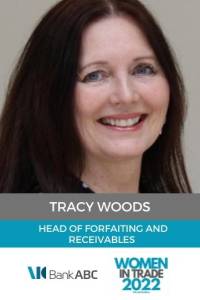
Have you encountered any related challenges in your career along the way to becoming who you are today?
I always wanted a career in an industry that I was passionate about. However, it is a huge challenge to juggle doing that together with the responsibilities of being a mother and the need for a work-life balance. It has been tricky particularly before we had blackberries/iPhones (and more recently the ability to work remotely!).
When you drop your children at the childminders and rush to work you feel guilty when you know other mum’s are watching their children as they are dropping and picking them up from school.
When you have to leave work “early” for your children you feel guilty that your colleagues are still working. For me this meant that I was constantly tired because I would work as hard as I could to make sure that I did not let anybody down, and I’ve been able to cross positives from my work life to my home life and vice-versa.
Work allowed me to keep my identity and has given me the strength, determination and confidence which have also been useful in my personal life. As a mother I was able to understand how better to support and nurture the team (and tell them off sometimes!) to aid their development and to deliver for the business.
What is so exciting about being involved in trade at this time?
As long as I can remember trade has been paper based. I’ve heard it said many times that trade will digitalise but it hasn’t happened. Until now and I am fortunate to be involved in the digital transformation project which is happening at Bank ABC.
I am currently involved in building the Bank ABC Supply Chain Finance platform. Once implemented the system will result in huge advantages to our customers as well as resulting in processing efficiencies (allowing us to focus on the customers and not “paperwork”) and help the environment (by moving, as far as possible, to being paperless).
This digital revolution has been a long time coming and I am proud to be involved in it and am confident that it will help to ensure that our customers continue to receive an excellent customer experience from Bank ABC.
Fran Young | Business Development Manager, Veridapt

Why did you choose a career in this sector?
The complexities and challenges facing the global energy sector and the world’s goal to reach net-zero targets attracted me to the industry – I want to be part of solving the problem.
I firmly believe innovative technologies are going to come from within the industry, not from governments or other external parties and it’s rewarding to be part of that journey.
And since taking up surfing a decade ago, I have developed a strong advocacy for the environment and playing a role in the development and uptake of new technologies and helping our customers reach their ESG goals is rewarding.
What do you enjoy the most about your job?
My personality has always been drawn to high performance. Whether that be at the corporate level, on a playing field, in my case the ocean, or in my personal life. Veridapt is a high-performing company, committed to providing the best technology and service it can.
Beyond that, the technological innovations that are occurring at Veridapt aimed at improving the energy and commodities trading sector makes me feel like I am part of a movement that is improving industry like never before. This includes empowering the growing number of women who are entering the trade finance sector.
In addition, our leadership team, and Dave Thambiratnam our CEO, place a premium on inclusiveness, equality and teamwork. This is both refreshing and inspirational. It shows what can be done when emphasis is placed solely on people working together on shared goals, regardless of gender.
On IWD, what is the most important message you want to send out to young women about to start their career?
Speak up in the moment – if you hear or see poor behaviour towards women (and men), speak up about it. To the person directly or to their manager. Do it with grace and dignity, but do it and make sure behaviour changes.
Help develop the company culture – talk to the leadership team about concerns with poor behaviours and how it can be improved. Continuously monitor the behaviour in a company – keep up the dialogue.
Be a leader – walk the talk. Always respect your colleagues, never fall into the trap of poor behaviour within a group chat. Be the one that calls it out and acts on it.
Challenges come in many forms. While there is no shortage of instances where being the sole female in a room makes it difficult at times to be heard, surfing often alongside a sea of men can require similar navigational skills, as both arenas can foster territorial instincts.
My message to young women is that your inner strength is your greatest asset. Draw on it, use it and realise this is the propeller that will drive you through any self-doubt. Surround yourself with people you respect and respect you and your womanhood.
Sponsors & Partners
Learn MoreMore about Women in Trade
- WITTP Over The Years
- Topics
- Podcasts
- Videos















